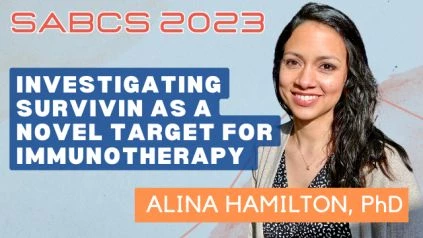Allen Wilbanks stood alongside Alina Hamilton, PhD, at the SABCS 2023 event, where they delved into groundbreaking research on breast cancer immunotherapy. Alina Hamilton, a postdoctoral research associate in the cancer control education program at the Lineberger Comprehensive Cancer Center, University of North Carolina Chapel Hill, shared insights on her work.
Motivated by the alarming 41 percent higher breast cancer mortality rate among black women, Hamilton explored Survivin as a potential immunotherapy target. Survivin, a protein in the inhibitor of the apoptosis pathway, showed associations with aggressive tumor features, especially in breast cancer. Despite smaller and less diverse previous studies, Hamilton and her team conducted a comprehensive study, revealing Survivin’s prevalence in aggressive breast tumors, notably in black women, predicting poor recurrence-free survival in ER-positive disease.
The significance of these findings lies in addressing the unmet clinical needs of black women diagnosed with aggressive breast cancer subtypes. Hamilton emphasized the potential of anti-survivin vaccines to stimulate an anti-tumor immune response, particularly in immune-cold breast tumors. Combining Survivin vaccines with checkpoint inhibitors, such as pembrolizumab, could open new avenues for treating aggressive breast cancers.
Hamilton’s study also uncovered a relationship between BRCA5, Survivin, and the breast cancer immune microenvironment. By identifying a subset of tumors with decreased anti-tumor immune response, the research offers insights into potential challenges and considerations in developing immunotherapeutic strategies for breast cancer patients.
In conclusion, Alina Hamilton’s work contributes significantly to understanding breast cancer disparities and paves the way for targeted immunotherapies that could improve outcomes, especially for underserved populations facing aggressive breast cancer subtypes.

